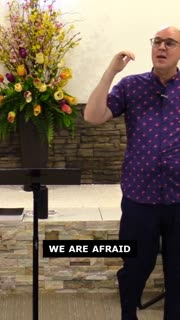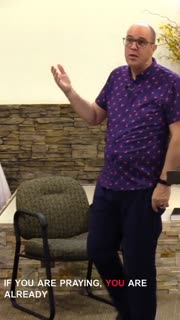Embracing Prayer: A Lifelong Dialogue with God
Devotional
Sermon Summary
Bible Study Guide
Sermon Clips
1. "Because we as believers many times detach our spiritual life from our life, or we think that God cannot see me here at work or at school or while I'm doing this or that, and we kind of have this wrongful idea that God listens to my prayers when I'm in church. God listens to my prayers when I'm living a good and healthy life. God listens to my prayers when perhaps I don't sin as often or as much. Then somehow God is pleased with me and he will hear my prayers. Nothing could be further from the truth, because we know that our prayer life is our life and we ought to pray always." [01:29] (53 seconds)
2. "Imagine if God said, in order for me to listen to your prayer, you have to pray at least one hour. Could you imagine? If God said that in his word, by the way, if you wanted me to hear your prayer and answer them, you will have to pray at least an hour. You can pray more, but at least one hour. Otherwise, I won't hear it. Then perhaps these excuses would be somewhat valid, wouldn't they? Oh my goodness. I work 40, 60 hours a week. Right? I get up in the morning. It's dark. I come back home. I have barely time enough. I have barely time to eat, to sleep. I can pray an hour." [03:38] (39 seconds)
3. "We are fearful because we do not know how it works. I don't know about you, but I remember growing up in church, and there were these people that prayed really loud. And they used fancy words. Okay, a couple of you are agreeing with me, right? You've probably been to church like that, or you grew up in a setting like that. And you listen to that, and you think, God must listen to his or her prayer. Because the way they're praying, oh, my goodness, I'm impressed. If I'm impressed, imagine how much more God is impressed." [04:12] (32 seconds)
4. "We are afraid of doing it wrong. And sometimes in that, it's not a fear of driving, skydiving, stuff like that. It could just be a fear of not doing it right. At home, and I don't know about you guys, but Claudia really loves Ikea. As the Swedish call it, Ikea, right? And every now and then, something appears at our doorstep that is about this high and about this long. I don't know if it's a bed, if it's a closet, if it's a duvet. I don't know what it is. But they appear, and who do you think is responsible for setting it up? Claudia, of course." [09:50] (43 seconds)
5. "We should pray because at times we are overwhelmed. Have you ever been overwhelmed? All of us. Who do you turn to? Psychiatrist, counselor, spouse, children, pastor, family friend. I don't know about you, but I remember the times in my life where I was extremely overwhelmed. When at times you can't even get out of your bed. The only one that you can turn to. So we ought to pray, and in these moments of overwhelming, overwhelm, notice how you don't seek for fancy words. God, I'm overwhelmed. Let me get out my thesaurus and start looking up for fancy words. Never happens." [12:24] (56 seconds)
6. "Trust comes before faith. I grew up in church, and Hebrews 11 was one of the go-to verses. Without faith, it is impossible to please God. Probably heard that Bible verse a time or two. But in order for us to have faith in God, we must what? Know God. And in order for us to know God, that means that we are establishing a trust in Him. Say you have a friend, and you know him, and you know that he's always late. Saturday morning, you're going to move. And you're like, hey, buddy, I need you Saturday morning at 8 o'clock to help me move. Are you going to be there?" [14:23] (48 seconds)
7. "Complaints are welcome. For some reason, people always think, you know what? When I pray, I ought to revere, respect, honor God. He has to see my good side, just like on a dating app, right? There's only the good side that is shown, never the other side. So I only must bring my good, healthy petitions to God. Complaints are welcome. When you've been married for a while, as we have, complaints are not the norm, but they're constant. They're there." [18:25] (38 seconds)
8. "If you are praying, you are already doing. You are already doing it right. If you're praying, don't let your busyness, internet, family, hobbies, work, whatever it is, don't let that get in the way of your prayer life. Because all of us, and I've been there several times, we give these justifications, these excuses, if you will. I can't. I don't know how. I'm too busy. God will not listen to this, petition. And we stop. And next thing you know, it's Sunday morning again. And there's a pastor talking about prayer. And you're trying to remember what was said last Sunday." [22:14] (50 seconds)
9. "Don't let these fears impede your prayer life of being awesome. Don't let these fears impede your prayer life of having communication with God Almighty, our creator. And then all the requests that you have will not be brand new fancy cars, mansions, or stuff like that. It will be for those loved ones who do not know you as their Lord and Savior. It would be for the sick people, for the homeless people, for the people that are socially outcast. For those who do not know Christ yet as their Lord and Savior, we will pray. We will pray, we will reach out, we will evangelize, we will stretch our hands because we know that God is listening." [26:36] (46 seconds)
10. "When you look at most of the revivals that started in the history of the church, and I encourage you to buy several books on this topic, do you know how most of them started? Usually, not always, but usually a group of small women praying in the middle of the week. Usually. You can go back to Azusa Street. There's a Welsh revival and so many others. Yes, there were some men as well, but many times you would see that a group of women, two, three, four, five, six, started praying, and God started moving. They weren't prayer warriors. They didn't know what to say, but they said, we want to come together to pray. We want to come together to seek you. We want to come together to hear from you." [25:49] (54 seconds)
Ask a question about this sermon
2. "Imagine if God said, in order for me to listen to your prayer, you have to pray at least one hour. Could you imagine? If God said that in his word, by the way, if you wanted me to hear your prayer and answer them, you will have to pray at least an hour. You can pray more, but at least one hour. Otherwise, I won't hear it. Then perhaps these excuses would be somewhat valid, wouldn't they? Oh my goodness. I work 40, 60 hours a week. Right? I get up in the morning. It's dark. I come back home. I have barely time enough. I have barely time to eat, to sleep. I can pray an hour." [03:38] (39 seconds)
3. "We are fearful because we do not know how it works. I don't know about you, but I remember growing up in church, and there were these people that prayed really loud. And they used fancy words. Okay, a couple of you are agreeing with me, right? You've probably been to church like that, or you grew up in a setting like that. And you listen to that, and you think, God must listen to his or her prayer. Because the way they're praying, oh, my goodness, I'm impressed. If I'm impressed, imagine how much more God is impressed." [04:12] (32 seconds)
4. "We are afraid of doing it wrong. And sometimes in that, it's not a fear of driving, skydiving, stuff like that. It could just be a fear of not doing it right. At home, and I don't know about you guys, but Claudia really loves Ikea. As the Swedish call it, Ikea, right? And every now and then, something appears at our doorstep that is about this high and about this long. I don't know if it's a bed, if it's a closet, if it's a duvet. I don't know what it is. But they appear, and who do you think is responsible for setting it up? Claudia, of course." [09:50] (43 seconds)
5. "We should pray because at times we are overwhelmed. Have you ever been overwhelmed? All of us. Who do you turn to? Psychiatrist, counselor, spouse, children, pastor, family friend. I don't know about you, but I remember the times in my life where I was extremely overwhelmed. When at times you can't even get out of your bed. The only one that you can turn to. So we ought to pray, and in these moments of overwhelming, overwhelm, notice how you don't seek for fancy words. God, I'm overwhelmed. Let me get out my thesaurus and start looking up for fancy words. Never happens." [12:24] (56 seconds)
6. "Trust comes before faith. I grew up in church, and Hebrews 11 was one of the go-to verses. Without faith, it is impossible to please God. Probably heard that Bible verse a time or two. But in order for us to have faith in God, we must what? Know God. And in order for us to know God, that means that we are establishing a trust in Him. Say you have a friend, and you know him, and you know that he's always late. Saturday morning, you're going to move. And you're like, hey, buddy, I need you Saturday morning at 8 o'clock to help me move. Are you going to be there?" [14:23] (48 seconds)
7. "Complaints are welcome. For some reason, people always think, you know what? When I pray, I ought to revere, respect, honor God. He has to see my good side, just like on a dating app, right? There's only the good side that is shown, never the other side. So I only must bring my good, healthy petitions to God. Complaints are welcome. When you've been married for a while, as we have, complaints are not the norm, but they're constant. They're there." [18:25] (38 seconds)
8. "If you are praying, you are already doing. You are already doing it right. If you're praying, don't let your busyness, internet, family, hobbies, work, whatever it is, don't let that get in the way of your prayer life. Because all of us, and I've been there several times, we give these justifications, these excuses, if you will. I can't. I don't know how. I'm too busy. God will not listen to this, petition. And we stop. And next thing you know, it's Sunday morning again. And there's a pastor talking about prayer. And you're trying to remember what was said last Sunday." [22:14] (50 seconds)
9. "Don't let these fears impede your prayer life of being awesome. Don't let these fears impede your prayer life of having communication with God Almighty, our creator. And then all the requests that you have will not be brand new fancy cars, mansions, or stuff like that. It will be for those loved ones who do not know you as their Lord and Savior. It would be for the sick people, for the homeless people, for the people that are socially outcast. For those who do not know Christ yet as their Lord and Savior, we will pray. We will pray, we will reach out, we will evangelize, we will stretch our hands because we know that God is listening." [26:36] (46 seconds)
10. "When you look at most of the revivals that started in the history of the church, and I encourage you to buy several books on this topic, do you know how most of them started? Usually, not always, but usually a group of small women praying in the middle of the week. Usually. You can go back to Azusa Street. There's a Welsh revival and so many others. Yes, there were some men as well, but many times you would see that a group of women, two, three, four, five, six, started praying, and God started moving. They weren't prayer warriors. They didn't know what to say, but they said, we want to come together to pray. We want to come together to seek you. We want to come together to hear from you." [25:49] (54 seconds)










